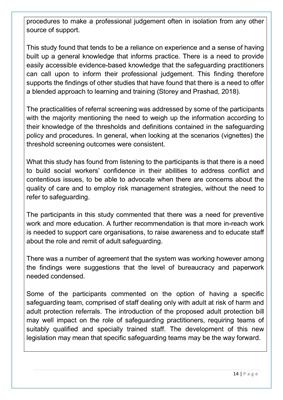
14 | P a g e
procedures to make a professional judgement often in isolation from any other
source of support.
This study found that tends to be a reliance on experience and a sense of having
built up a general knowledge that informs practice. There is a need to provide
easily accessible evidence-based knowledge that the safeguarding practitioners
can call upon to inform their professional judgement. This finding therefore
supports the findings of other studies that have found that there is a need to offer
a blended approach to learning and training (Storey and Prashad, 2018).
The practicalities of referral screening was addressed by some of the participants
with the majority mentioning the need to weigh up the information according to
their knowledge of the thresholds and definitions contained in the safeguarding
policy and procedures. In general, when looking at the scenarios (vignettes) the
threshold screening outcomes were consistent.
What this study has found from listening to the participants is that there is a need
to build social workers' confidence in their abilities to address conflict and
contentious issues, to be able to advocate when there are concerns about the
quality of care and to employ risk management strategies, without the need to
refer to safeguarding.
The participants in this study commented that there was a need for preventive
work and more education. A further recommendation is that more in-reach work
is needed to support care organisations, to raise awareness and to educate staff
about the role and remit of adult safeguarding.
There was a number of agreement that the system was working however among
the findings were suggestions that the level of bureaucracy and paperwork
needed condensed.
Some of the participants commented on the option of having a specific
safeguarding team, comprised of staff dealing only with adult at risk of harm and
adult protection referrals. The introduction of the proposed adult protection bill
may well impact on the role of safeguarding practitioners, requiring teams of
suitably qualified and specially trained staff. The development of this new
legislation may mean that specific safeguarding teams may be the way forward.